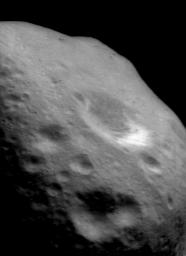
|
Eros’ Battered Surface
- Click the image above for a larger view
- Full-Res JPEG (371 x 511) (17.9 kB)
- Full-Res TIFF (371 x 511) (107.8 kB)
Caption:
NEAR Shoemaker captured this image of Eros on November 28, 2000, while taking a color flyover movie from 193 kilometers (120 miles) away. This particular view simultaneously shows several key indicators of the battering Eros' surface has sustained over the eons. Most obvious are the countless craters, some barely big enough for the camera to see. Less obvious are the signs of a layer of fragmental debris, or regolith, blanketing the surface. Among them are the rounded horizon, the boulders visible in the distance, and the bright patches of exposed subsurface material on steep slopes. This scene is approximately 6.6 kilometers (4.1 miles) across.
Background Info:
Built and managed by The Johns Hopkins University Applied Physics Laboratory, Laurel, Maryland, NEAR was the first spacecraft launched in NASA's Discovery Program of low-cost, small-scale planetary missions. See the NEAR web page at http://near.jhuapl.edu/ for more details.
Cataloging Keywords:
| Name | Value | Additional Values |
|---|---|---|
| Target | 433 Eros | |
| System | Near Earth Objects | |
| Target Type | Asteroid | |
| Mission | NEAR Shoemaker | |
| Instrument Host | NEAR Shoemaker | |
| Host Type | Orbiter | |
| Instrument | Multi-Spectral Imager (MSI) | |
| Detector | ||
| Extra Keywords | Crater, Grayscale | |
| Acquisition Date | ||
| Release Date | 2001-02-17 | |
| Date in Caption | 2000-11-28 | |
| Image Credit | NASA/JPL/JHUAPL | |
| Source | photojournal.jpl.nasa.gov/catalog/PIA03125 | |
| Identifier | PIA03125 | |
